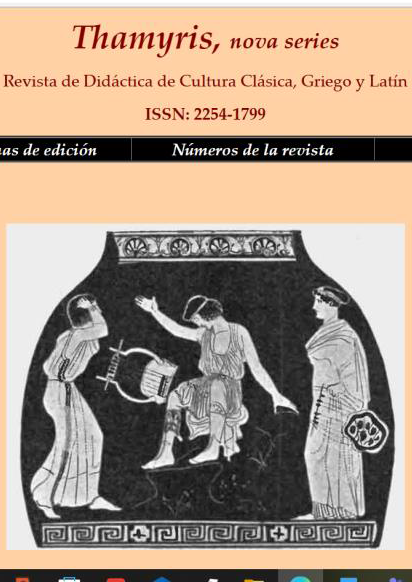Historia de los nombres de guerreros desde Homero hasta la Atenas clásica: el léxico de los guerreros y sus armas a través de la morfología
DOI:
https://doi.org/10.24310/thamyristhrdcc.v13i16301Keywords:
Agent nouns, derivation, militar lexiconAbstract
In this paper we outline the history of the lexicon of weapons and warrior names in terms of their relevance in literary texts from Homer to the Classical Age. As a starting point, we take the formations found with the agentive suffixes -???, -???, and -??? and quantify the number of occasions they appear in order to determine the evolution of the lexicon by material culture (types of weapons, offensive or defensive that were used in each period, types of soldiers, etc.). This provides a general framework of a specific lexical field which can help to teach this subject from Greek. The materials offered allow for different levels of reading according to the level of the students. In addition to lexical competence, this group of nouns allows the morphological question of derivation and suffixes of agent nouns to be addressed.
Downloads
Metrics
References
Aura Jorro, F. (1999 [reimpr.]), Diccionario micénico (DMic.), 2 vols., CSIC, Madrid.
Aura Jorro, F. er alii (2020), Suplemento al Diccionario micénico (DMic.Supl.), CSIC, Madrid.
Balles, I. (2008), “Nominale Wortbildung des Altgriechischen”, en R. Lühr (ed.), Nominale Wortbildung des Indogermanischen in Grundzügen, vol. 1, Hamburgo, 169-243.
Bernabé, A. (1998), “Hom. ?????????? y mic. a-pi-qo-to, ¿un caso de etimología popular?”, en L. Gil et alii (eds.), Corolla Complutensis in memoriam J. S. Lasso de la Vega contexta, Editorial Complutense, Madrid, 39-48.
Bernabé, A. (2007), “El vocabulario de las armas en micénico”, Gladius, 27, 15-38.
Buck, C. D. & Petersen, W. (1970), A Reverse Index of Greek Nouns and Adjectives, Georg Olms Verlag, Hildesheim.
Chantraine, P. (1933), La formation des noms en grec ancien, Klincksieck, París.
DELG = Chantraine, P. et alii (2009), Dictionnaire étymologique de la langue grecque (Histoire des mots), Klincksieck, París.
EDG = Beekes, R.S.P. (2010), Etymological Dictionary of Greek, 2 vols., Brill, Leiden-Boston.
Enfield, N.J. & Kockelman, P. & Sidnell, J. (eds.) (2014), The Cambridge Handbook of Linguistic Anthropology, Cambridge University Press, Cambridge.
Foley, W.A. (1997), Anthropological Linguistics: An Introduction, Wiley-Blackwell, Oxford.
García Blanco, J. & Macía Aparicio, L.M. (1998), Homero. Ilíada, volumen II (cantos IV-IX), CSIC, Madrid.
Gómez Espelosín, F.J. (2001), Historia de Grecia Antigua, Akal, Madrid.
Horrocks, G. (20102), Greek. A History of the Language and its Speakers, Wiley-Blackwell, Londres-Nueva York.
Hoz, J. de (2010-2011), Historia lingüística de la Península Ibérica en la Antigüedad, 2 vols., CSIC, Madrid.
Hunter, V.J. (1994), Policing Athens: Social Control in the Attic Lawsuits, 420-320 B.C., Princeton University Press, Princeton.
Lazzeroni, R. (2010), “Nomi d’agente e composizione in Greco antico: una scala di nominalità”, en I. Putzu & G. Paulis & G.F. Nieddu & P. Cuzzolin (eds.), La Morfologia del greco tra tipologia e diacronia. Incontro Internazionale di Linguistica Greca celebrato en Cagliari, del 13 al 15/9/2007, FrancoAngeli, Milán, 256-265.
Le Feuvre, C. (2015), ?????? ??????????: réinterprétations de termes homériques en grec archaïque et classique, Droz, Ginebra.
Macía Aparicio, L. M. (2009), Homero: Ilíada, volumen III (cantos X-XVII), CSIC-Tirant lo Blanch, Madrid.
Muhly, J. D. (2011), "Bronze", en M. Finkelberg (ed.), The Homer Encyclopedia, Wiley-Blackwell, Oxford, 145-146.
Nippel, W. (2007), “Police”, en Ch. F. Salazar (ed.), Brill’s New Pauly. Encyclopedia of the Ancient World. Antiquity, vol. 11 (Phi-Prok), Brill, Leiden-Boston, 463.
Piquero, J. (2019), El léxico del griego micénico (Index Graecitatis): Étude et mise à jour de la bibliographie, A.D.R.A.-Éditions de Boccard, Nancy-París.
Risch, E. (19742), Wortbildung der homerischen Sprache, De Gruyter, Berlín-Nueva York.
Rodríguez Adrados, F. (1956), Líricos griegos: elegíacos y yambógrafos arcaicos (siglos VII-V a.C.), volumen I, Ediciones Alma Mater, Barcelona.
Ruiz Abad, C. (2014), Papeles semánticos y procedimientos de formación de palabras: los nombres de instrumento y ubicación en griego antiguo en perspectiva tipológica, Tesis doctoral, Madrid:
<http://eprints.ucm.es/24939/1/T35256.pdff >.
Schubert, P. (2000), Noms d’agent et invective: entre phénomène linguistique et interprétation du récit dans les poèmes homériques, Vandenhoeck & Ruprecht, Gotinga.
Von Bredow, I., 2008, “Scythae”, en Ch. F. Salazar (ed.), Brill’s New Pauly. Encyclopedia of the Ancient World. Antiquity, vol. 13 (SasSyl), Brill, Leiden-Boston, 150-159.





